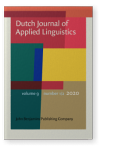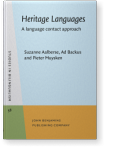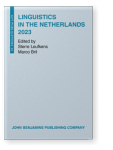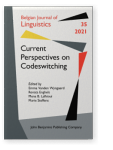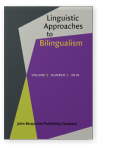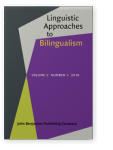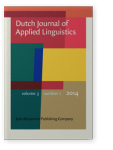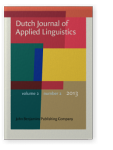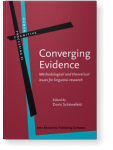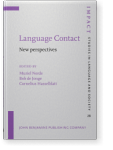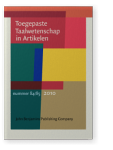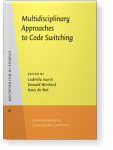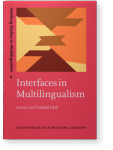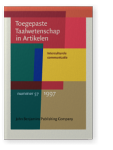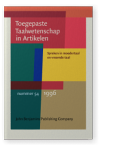Ad Backus
List of John Benjamins publications for which Ad Backus plays a role.
Journal
Title
Heritage Languages: A language contact approach
Suzanne Aalberse, Ad Backus and Pieter Muysken
[Studies in Bilingualism, 58] 2019. xix, 302 pp.
Subjects Applied linguistics | Contact Linguistics | Language acquisition | Multilingualism | Sociolinguistics and Dialectology
2024 Individual variation in contact effects – stability, convergence, and divergence Linguistic Approaches to Bilingualism: Online-First Articles | Article
In this study, we investigate the contact effects of stability, convergence, and divergence regarding the use of the same linguistic construction in the same contact situation. To do that, we collected experimental production and judgment data by native German speakers living in the Netherlands… read more
2023 Minds: Big questions for linguistics in the age of AI Linguistics in the Netherlands 2023, Leufkens, Sterre and Marco Bril (eds.), pp. 301–308 | Article
2023 The Netherlands Urban Field Station: How language diversity promotes equality of opportunity Linguistics in the Netherlands 2023, Leufkens, Sterre and Marco Bril (eds.), pp. 293–300 | Article
2023 The Netherlands Urban Field Station: Taaldiversiteit inzetten voor gelijkere kansen Linguistics in the Netherlands 2023, Leufkens, Sterre and Marco Bril (eds.), pp. 285–292 | Article
2023 Is ‘he’ still here? Exploring the contemporary use of masculine subject pronouns for women in Dutch dialects Linguistics in the Netherlands 2023, Leufkens, Sterre and Marco Bril (eds.), pp. 194–209 | Article
Various non-standard language varieties in the Netherlands traditionally allow for the use of masculine personal subject pronouns (i.e. regionally distinct variants of hij ‘he’) in reference to women. While this practice is well-documented within Dutch dialectology, especially during the… read more
2021 Intense Turkish-Dutch bilingualism leads to intense Turkish-Dutch mixing: A usage-based account of increasing integration of two typologically different languages Current Perspectives on Codeswitching, Vanden Wyngaerd, Emma, Renata Enghels, Mena B. Lafkioui and Marie Steffens (eds.), pp. 13–33 | Article
Codeswitching in the Turkish migration settings in Western Europe has been studied almost since the beginning of the labor migration that formed these communities. The patterns of codeswitching have gradually become more complex, which is demonstrated with reference to data from the Netherlands.… read more
2018 Quantifying cross-linguistic influence with a computational model: A study of case-marking comprehension Linguistic Approaches to Bilingualism 8:5, pp. 561–605 | Article
Cross-linguistic influence (CLI) is one of the key phenomena in bilingual and second language learning. We propose a method for quantifying CLI in the use of linguistic constructions with the help of a computational model, which acquires constructions in two languages from bilingual input. We… read more
2018 Constructively combining languages: The use of code-mixing in German-English bilingual child language acquisition Linguistic Approaches to Bilingualism 8:3, pp. 393–409 | Article
Language development in bilingual children is often related to differing levels of proficiency. Objective measurements of bilingual development include for example mean length of utterance (MLU). MLU is almost always calculated for each language context (including both monolingual and code-mixed… read more
2014 Bilingual constructions: Reassessing the typology of code-switching Dutch Journal of Applied Linguistics 3:1, pp. 30–44 | Article
Code-switching comes in three major sub-types: insertion, alternation, and congruent lexicalization. Turkish-Dutch code-switching is supposed to feature the first two types but not the third, because when the languages in contact are typologically distinct, there is not enough shared lexicon and… read more
2013 Do we teach the real language? An analysis of patterns in textbooks of Russian as a foreign language Dutch Journal of Applied Linguistics 2:2, pp. 224–241 | Article
This article is about the type of language that is offered to learners in textbooks, using the example of Russian. Many modern textbooks of Russian as a foreign language aim at efficient development of oral communication skills. However, some expressions used in the textbooks are not typical for… read more
2011 Islands of (im)productivity in corpus data and acceptability judgments: Contrasting two potentiality constructions in Dutch Converging Evidence: Methodological and theoretical issues for linguistic research, Schönefeld, Doris (ed.), pp. 165–192 | Article
Dutch has a number of constructions for expressing that a particular event is likely or possible. Two of these, one using a derivational morpheme and the other a copula construction, are investigated to see whether they are both productive and to what degree their meanings overlap. Their… read more
2010 Turkish in the Netherlands: Development of a new variety? Language Contact: New perspectives, Norde, Muriel, Bob de Jonge and Cornelius Hasselblatt (eds.), pp. 87–102 | Article
This paper is about Dutch influence on the variety of Turkish spoken by immigrants in the Netherlands. The community is under constant pressure to shift to Dutch, but maintenance figures are nevertheless very high. The result is a contact situation in which the entire community is bilingual;… read more
2010 Individual Differences in the Perception of Entrenchment of Multiword Units: Evidence from a Magnitude Estimation Task Toegepaste Taalwetenschap in Artikelen 84/85, pp. 155–165 | Article
While for a long time words and grammatical rules were regarded as the basic units in language, it has become increasingly clear that we have a much more varied set of units at our disposal, including multiword chunks. How such chunks are represented, which factors contribute to their entrenchment… read more
2009 12. Codeswitching as one piece of the puzzle of language change: The case of Turkish yapmak Multidisciplinary Approaches to Code Switching, Isurin, Ludmila, Donald Winford and Kees de Bot (eds.), pp. 307–336 | Article
2006 Limits to modularity: The ‘insertion’ of complex ‘lexical’ constructions in codeswitching Interfaces in Multilingualism: Acquisition and representation, Lleó, Conxita (ed.), pp. 261–279 | Article
1997 Voorwoord Interculturele communicatie, pp. 5–8 | Article
1996 Het Intergenerationele Codewisseling-Continuum Binnen De Turkse Gemeenschap in Nederland Spreken in moedertaal en vreemde taal, pp. 25–37 | Article
New data on Turkish-Dutch codeswitching (CS) have uncovered patterns not previously attested in this language pair. It turns out that three different generations within the immigrant community switch in three different ways. For the first generation, CS mostly concerns the occasional insertion of… read more
